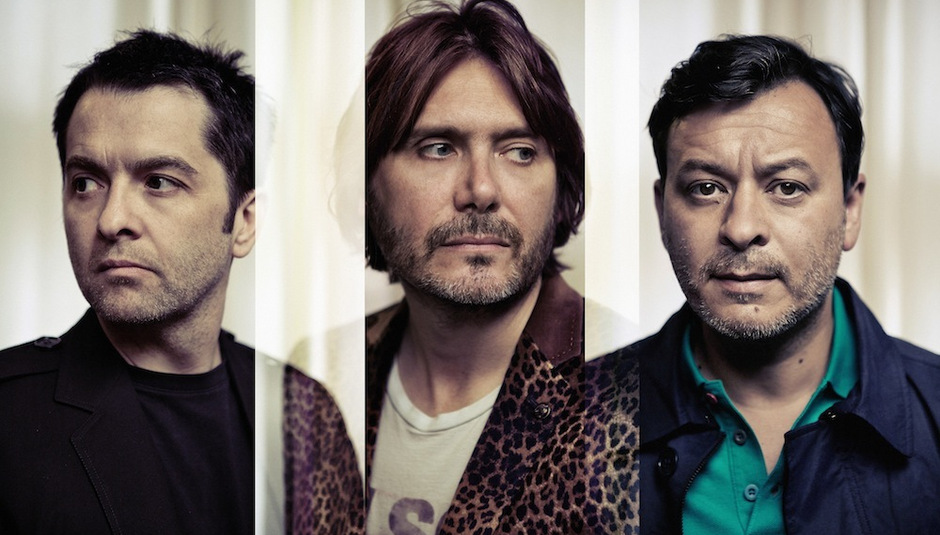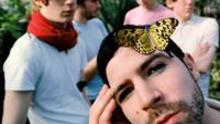A recent review of the new Manic Street Preachers single speculated that the band’s consistently good press coverage is due to a disproportionate amount of 30-something music journalists who over-romanticise the firebrand, iconic acts of their youth. Even bass player and propagandist-in-chief Nicky Wire thinks there’s something in this. “We’ve never inspired anyone really, band-wise,” he says, “but we’ve inspired lots of journalists and academia and people doing PhDs on RS Thomas.” Even with that caveat in mind, their latest album, Futurology, has received notices it’s impossible to downplay. Their twelfth record follows less than a year after their eleventh, the introspective, downbeat Rewind the Film and is everything that album wasn’t. Where the former was a mostly acoustic inward sigh, focused on, as Wire puts it, “midlife, staring in the mirror, RS Thomas, myself and my country... it’s all over”, its successor compliments it in opposition: electronic, punkish, and outward facing, it sees its creators inspired not by their own shortcomings and fears, nor largely by their anger, but by creativity, energy and movement for their own sake, a “celebration of ideas” according to Wire. It’s an album steeped in Art and affirmation. While Rewind The Film was a strong record, it’s also one that made sense from a forty-something Manics, lost in sepia and faded melancholy. Futurology is all primary colours and speed and few of us saw it coming.
Wire and frontman James Dean Bradfield are clearly excited by it too. “It’s the first time I’ve been given lyrics since The Holy Bible, where I’d think ‘I never thought I’d be writing music to a lyric like this’”, says Bradfield. “I definitely had that feeling with some of these lyrics too. I definitely had it with ‘Europa Geht Durch Mich’, that moment where I thought ‘well nobody else would try and write this song.’ With ‘Misguided Missile’ it felt like we were trying to cram as much narrative into the song as possible, like we did on The Holy Bible with ‘IfWhiteAmerica….’, ‘Misguided Missile’ has four different choruses, four different lyrics - no bands do that anymore.”
From their dark masterpiece, The Holy Bible, to 1996’s lurch from brutal nihilism to stadium triumph with Everything Must Go, to following their “big, crowd pleasing comeback record” Send Away the Tigers with an art-rock project in Journal For Plague Lovers, to Nicky Wire making a solo album, the Manics have always gloried in wrong-footing everyone, in being the version of themselves we least expect. Futurology feels part of that shifting process - few bands can be galvanizing on their twelfth release.
”To understand your country you must understand yourself” writes Wire on ‘Misguided Missile’, and it serves as a shorthand to the album itself. The soul of the record really comes from a vacuum, and what rushed in to fill that vacuum.
To understand Futurology, you also need to understand that to get there the band had to jettison the old version of themselves as a mega-selling Oasis-level indie-rock band. Their tenth album, 2010’s Postcards from a Young Man, was constantly touted by Wire as “one last shot at mass communication” (a PR line that Bradfield reckons he was against all along), the last time they’d aim for the stadium hits and arena tours. They underlined it with a singles collection the following year, and that was that - double underline. The Manics wanted to be something else entirely.
“I think there was a sad realism,” says Wire, “in me in particular, that I couldn’t see any other band that had gotten to our stage and could still expect to have hit singles and sell lots of albums, Postcards did 150,000 in the UK, which you would just die for now, but when you passed your tenth album I couldn’t find any tracks or albums by any bands - save maybe the odd U2 track - that still function at that level; be it The Who, be it The Stones, anyone. I thought we might be degrading ourselves if we kept chasing that dream.”
“There is a certain sadness that that ‘Guinness Book of Hit Records’ doesn’t matter anymore,” says Bradfield,”we used to go through it all the time. You kind of resign yourself to the fact that a track like ‘Some Kind of Nothingness’, if we’d released it in the [1998 album] This Is My Truth Tell Me Yours year, would have been a fucking gigantic hit, and you’ve just gotta accept it’s not now. I suppose part of that statement was accepting that. We have done this, but we’ve got to move on. “
“When ‘Rewind the Film’, the song, came out and it had six million streams or whatever, over the six weeks, it just fucking meant nothing,” says Wire “but if it had gone in at number 26 I’d have been… we’re still from that culture, but we’ve got to let it go or it’ll kill us. When ‘Some Kind of Nothingness’ didn’t get top 40 I was devastated, I was just on the floor. I think we’d had 36 consecutive top 40s, and that went in at 46.”
“There’s still a hardcore [of our fans] and if you go around the country people still know you’re there,” says Bradfield, “but there is a certain type of person that has three kids now, and you’ll bump into them, and they’ll recognise you and say ‘are you still going?’ You’ve got to accept that some people have left the musical realm, and unless you’re on Graham Norton they don’t know the music exists. Things are just divided like that.”
“Having said that,” adds Wire, “we’ve sold 55,000 tickets already this year, it feels like we’re having some of the best reviews we’ve had for a long time. Americans would say business is healthy. It’s just a different consciousness.”
“Music has retreated in the cultural landscape, it’s as simple as that.” says Bradfield, Wire adding “For us that’s depressing as obsessives and as music fans.”
The conscious break from their history mirrors a more gradual evolution happening in the band anyway, as the traditional tropes of the Manic Street Preachers got shot down one by one. The typical view of a band with Bradfield and drummer Sean Moore as the musical wing, with Wire as the tone-deaf lyricist who once rated himself “nought out of ten as a bass player” is simply not true any more. These days Bradfield will quietly pen the lyrics for at least one song per album( ‘I Think I Found It’, ‘Anthem for a Lost Cause’ and ‘Next Jet to Leave Moscow’ on their last three), whereas Wire now writes and arranges songs in their entirety, music and lyrics, and 25 years of constant playing has made him more than a competent bass player, writing fluid and quite funky parts that are more sepia-tinged Motown than they are punk. Bradfield may still do the lion's share of the singing, but across recent records he’s been joined by a succession of duets (including Ian McCulloch, Richard Hawley, Lucy Rose, Cate Le Bon, Green Garside and Georgia Ruth), while Wire is doing more lead vocal parts himself.
“I think, just...thank god.” says Bradfield of their evolution. “Also, the fact we can do so many duets and stuff... We’re plainly aware of the fact this is our twelfth album, there’s only so many fucking ways I can sing a song. Georgia Ruth [who sings ‘Divine Youth’ on the new album] is always going to find the magenta in the rainbow, and I can’t fucking find that colour in my voice, she’s always going to find something much more subtle. She’s always going to give way to the emotion in it, and sometimes I just fucking confront words when I sing them.”
“I was quite shocked when James showed me ‘Next Jet...’ because it just read like one of my lyrics,” says Wire. “James is normally more humane in his lyrics and this was quite sarky and just fucking nasty.” “Using guest vocalists and all writing in different ways - I think we wouldn’t be in a band if we hadn’t done that.” adds Bradfield “If we hadn’t been scared enough to let go of our writing positions, or let go of somebody else singing the lead vocal I think it would be much harder for us to create a record that we liked. I think if you’ve been together as long as us, I mean, it is insane. People know that we grew up together, and that we grew up in a mining town in South Wales, but if you actually saw the amount of time we’ve spent with each other, it’s truly fucking insane. If we couldn’t actually tap into things the way we do now, if we couldn’t mainline straight into a song and create things around it, and shift positions in the band, we’d have learnt nothing. That doesn’t mean we’re going to shift around the stage fucking swapping instruments. We ain’t going to fucking do that. But not to have learned new things? It would have been pretty sad.”
Even as they took to the O2 stage at Christmas 2011 to play all 38 of their singles, they already knew what would come next would be very different. ‘Running Out of Fantasy,’ ‘Four Lonely Roads’ and ‘Black Square’ had already been written, and the original plan was to work towards one double album of their new material, with Wire hinting at the time that it could rival Magnetic Fields’ classic 69 Love Songs in its scope (70 Songs of Hatred and Failure was hinted as possible title by a possibly tongue-in-cheek Nicky Wire). It was the arrival of the Futurology material that really started to shape the bands immediate plans: “It just became so apparent when we compared ‘Europa Geht Durch Mich’ to ‘Sullen Welsh Heart’ that my idea of shoe-horning everything into 70 tracks or whatever was an impossibility.” says Wire, “The differences were too cosmic, they were a universe away from each other, lyrically as well as musically.”
“For me it was ‘The View From Stow Hill’,” says Bradfield “when we were in the studio it was just me and Loz, the engineer, we did it as an acoustic track and I sang on top to a click track. Then I went away for two days, and Sean was in the studio and he turned it into something that didn’t quite fit Rewind… any more.”
The double album concept was rejected in favour of two very different records, though actually the two become such a black mirror for each other, working so well in opposition, that they actually form a satisfying pairing all the same (“more by accident than design” says Wire).
While the Rewind the Film material was focusing on more classic Manics tropes of personal alienation and decline, themes Wire had been mining since at least the weary This Is My Truth, Tell Me Yours in 1998, if not before, the album that would become Futurology was energising the band in new ways. An extensive tour around mainland Europe, the former Eastern Bloc and Scandinavia was creating a sense of movement and speed that was bleeding into Wire’s themes, as the optimism and art of those countries, especially the futurist movement became a major source of inspiration.
“In particular” says Wire, “when we went through the heart of Europe, starting in Antwerp and Amsterdam, going through to Prague, Berlin, I was getting into the Die Brücke school of art, the idea of of Expressionism and Modernism, whether it was Munch up in Oslo, or whether it was Die Brücke quite a long way away, it was a similar kind of feeling, that it was time to paint what you feel, rather than what you see. Not that obsession of Victorian Britain of just painting rich people having picnics and all that awful stuff. Britain was miles behind Europe, miles behind Russia, and then you have Malevich’s Black Square, which had a massive impact on me, the idea of saying ‘all art that has gone before - forget it, this is the future’, the Futurist Manifest, and all of that combined with traveling through those places and seeing the art itself. I went to the Die Brücke museum with my kids, we avoided the jubilee and I took them on holiday to Berlin, just all those things, the idea of artistic isms is much more prevalent on this album than books or other music.”
There’s a nice symmetry here of course. The band formed under the shadow of the cold war in the late eighties, and as they have grown, changed, lost and won, so has the continent. Since the bands inception the map of central Europe has been substantially redrawn and remoulded, rejecting old ideas for new. It’s a nice allegory for the Manics themselves. “A Marxist reinterpretation of our history through social collapse?” Wire scoffs, “The change [in those countries] is unimaginable, even in Berlin, let alone Prague or the rest of the countries we’ve been in. It can be problematic at times in certain of the former Eastern-bloc countries, because of the cliche of us with a hammer and sickle flag and all that, it hasn’t gone down well in the countries that have struggled to get freedom from those symbols, which is perfectly understandable. It’s a slightly dumb, rock n’roll thing to do, to go on Top of the Pops with a gigantic hammer and sickle, while singing “Suicide Is Painless”, and going to Cuba and stuff.”
“The first thing you notice when you travel around,” says Bradfield, “if you’re looking at Europe through the prism of having travelled as a band for 22 years, the biggest change you see is experiencing all the signs of soft corporate power, in every country you go to, that alone changes your mindset completely, that soft power, that corporate colonisation of places is inevitable. Certain parts of you just give in to that, you do feel everything is post-ideological now. Post-ideology is just there. You don’t feel as if you can have a closely held belief that is offended by anything, that’s the way I stand on it.”
And there’s the rub, because as we said before you can see the origins of Futurology as coming from a position of vacuum. A band who always had so much to say about -everything- finding themselves in the position where they no longer know who to root for. There’s plenty to complain about, but very few solutions, and that’s not a satisfying position to write from. The ideas in the politics of British life can no longer fuel a Manics album, which has left room for the bold colours of modern art to explode in Wire’s head.
You can hardly be surprised that their relationship with British politics has crumbled so much; as last year's ‘Thirty Years War’ proved, all Wire has left now is anger and sadness on that front, and recent trips through what The Guardian optimistically refer to as ‘The New East’ (former Eastern-bloc countries), and their famous, flawed trip to Cuba to launch the Know Your Enemy album in 2001 must surely affect their relationship with socialist ideals?
“When we went to Cuba it certainly wasn’t as card-carrying communists.” says Wire, “We didn’t believe that Cuba was a nirvana-like state, it was much more half-rock n’ roll romance, half the idea of the beaten down underdog. Looking back it was the greatest folly in rock'n’roll. It cost us hundreds of thousands of pounds, it did us no favours at all, caused us a lot of problems”. “And alienated about two thirds of the people who bought This Is My Truth, Tell Me Yours” adds Bradfield. “In terms of our relationship to the left, that’s more been shaped by the kind of dereliction of New Labour.” explains Wire, “Communism was always more of a romantic dream than a reality, where as the New Labour years had the chance to do something tangible. I think that’s what disenchanted us more.”
“We’re always aware we’ve played around with former Eastern Bloc imagery,” says Bradfield, “but the nuts and bolts of our ‘socialist’ beliefs are, and it’s not an exciting thing to say, but public ownership of gas and utilities. That’s the building block of what we believe socialism was. There are so many different notions of what being ‘leftist’ is, and that particularly was ours, that people believed they could still have some ownership over their country, some kind of control, and certain things would stem from that.”
“We were certainly never militant Labour, at the end of the Sixties, the Seventies,” says Wire, “we always considered ourselves classic Labour of the post-war years. We were never militant Labour, we were never New Labour, we always considered ourselves something different to that.”
“I can’t even think about how other countries shaped or realigned my political thinking,” adds Bradfield, “because I know everything starts with the utter disenchantment with what New Labour left us as a legacy and what the Coalition has continued.”
“I certainly find the calmness and stoicism in German politics is kind of inspiring,” says Wire, “post-war obviously, there’s a massive push for modernism, design and technology that’s all based on boring stuff like apprenticeships.”
“And it’s all based on a leader,” Bradfield explains, “and I’m not saying I agree with everything Angela Merkel stands for, but can you imagine her ever getting voted for in a place like Britain? The compass that still exists in British politics, even seeing the way people took to fucking Cameron, or Clegg when people liked him for a month, with Merkel they’d just go ‘who the hell are you’? They would never think that she could be a great politician.”
“And they’ve obviously worked in Coalition virtually every parliament since the war.” adds Wire, “They’ve found a way to make Coalition effective, there’s a massive green element in there as well, a massive left wing element, but it all feeds into the philosophy of doing the right thing. I can’t help but like it.”
“I just get sick of our sanctimonious way of judging the world.” says Bradfield, “We accuse Qatar of being bent in their bid for the world cup- but how much did Vince Cable sell the Post Office for?”
“At least four billion, at least.”
“The Dutch mail was sold for 2.5 billion and that’s much smaller than ours, I think it’s a third of the size. I can’t decide what Eastern Bloc countries make me feel about politics when we live in such a cruddy little political country now.”
“The disenchantment with politics diminishes me as a person,” Wire explains, “because I’ve always loved politics and been engaged, I used to bunk off school to watch the fucking Trade Union Congress, which is as boring as you can get. So I don’t feel good about feeling disempowered, because I don’t want to.”
The vacuum left by political idealism, and by the concrete knowledge of what kind of band they were for the best part of a decade has been filled by a glowing excitement in ideas, and it’s that, more than anything else that makes Futurology such a turning point for the Manic Street Preachers.
“It’s just less political,” Wire says, “it’s opinionated in terms of saying of art, what is that Anselm Kiefer quote? ’I am held together in the nothingness of life by art’, or ’memory is my only home.’. I feel like that at the moment, that I get so much inspiration certainly from visual art, certainly from the birth of modernism, much more than I do from any other facet. That’s certainly fed into the record, it’s such an album of lyrical ideas and cross references and connection which perfectly crystallised in Bologna. We did the festival there last weekend and realised so much Futurism was there. I was back at the hotel and the turn-down lady hands me a book, Futurism In Bologna, I thought ‘this is a nice service rather than changing the pillows’. I read that and realised that the first Futurist exhibition was in the basement of the hotel we were staying in, and then realising we’d been talking about the two towers in Bologna and that’s the front cover of ‘She Is Suffering’ [back in 1994], which was painted by Kippenberger, the German artist, because he’d been obsessed with these two towers in Bologna… It just sums up everything that’s good about our Greil Marcus Lipstick Traces life, when the dots are joined, which is what the lyrical conceit of this album is about.”
Maybe the creative reboot implied in Futurology isn’t quite such a new thing after all? The politics of disenchantment and the glory of artistic revolution? Come to think of it, that’s been the Manic Street Preachers all along.
Futurology is out now.
























